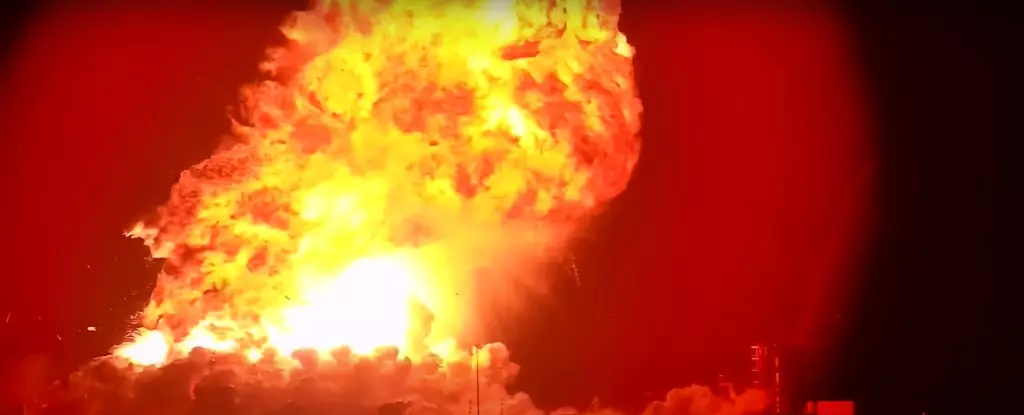In a spectacular demonstration of the challenges inherent in space exploration, SpaceX experienced a catastrophic failure when its Starship rocket exploded during a routine ground test in Texas. This incident is not merely a setback; it is a stark reminder of the unpredictable, often perilous nature of pushing the boundaries of technological innovation. The fireball that erupted from the Starbase facility went beyond just flames and smoke; it signified the fragility of human ambition against the unforgiving backdrop of space.
Elon Musk’s aspiration to colonize Mars is an audacious dream that draws both admiration and skepticism. The gravity of this explosion looms larger when we consider that SpaceX is not new to failures. Prior tests have seen similar fates, with the Starship prototypes meeting their end in flames over oceans or rainforests. Yet, Musk’s inspiring mantra of “fail fast, learn fast” carries a paradox; while it promises accelerated learning, each failure imposes real costs, both financially and on public perception.
Operational Risks and Safety Protocols
SpaceX has established a rigorous safety protocol around its test sites, a necessity given the explosive nature of rocket testing. In this instance, the announcement that personnel were safe and accounted for does little to alleviate the inherent risks of such endeavors. The reliance on high-powered rockets, such as the Super Heavy booster, elevates the stakes significantly. Here, engineering wizardry meets moments of sheer terror—a pressurized tank failure disrupted not just machinery but also the dreams of many who look toward Mars as humanity’s next frontier.
Musk’s casual dismissal of the incident as “just a scratch” reveals an audacious ethos, one that some could argue borders on recklessness. The interpretation of setbacks as mere inconveniences can downplay the emotional and psychological ramifications for those involved in these complex projects. While it may invigorate the company’s culture, it risks eroding trust in the overarching mission, especially when failures accumulate.
Community Impact and Environmental Concerns
The larger implications of these rapid test launches extend into the sphere of community and ecological preservation. The very location of Starbase, a site situated near the border with Mexico, is critical for the local ecosystems and wildlife, including endangered sea turtles and shorebirds. Advocacy groups have expressed alarm about the expansion of SpaceX’s testing and launch operations, and although the Federal Aviation Administration recently increased launch approvals, it did so amidst considerable controversy. This raises ethical questions: Is the race to Mars worth the potential harm to our planet’s natural habitats?
While Musk and his company tout the benefits of space exploration as a pathway to sustainable human life beyond Earth, the underlying costs to our present environment cannot be ignored. The expansion of testing and subsequent failures pose a complicated narrative that pits progress against preservation. A more centered approach would incorporate ecological concerns alongside futuristic aspirations, demanding accountability from corporations that seek unfettered growth.
The Future of SpaceX and Technological Determinism
Despite these alarming setbacks, one has to wonder if SpaceX’s aggressive strategy of embracing failure is a path toward future success—or a train barreling towards chaos. The company appears undeterred, leaning into its notions of rapid iteration and learning. However, it would benefit from a more robust conversation about the implications of its actions, reflecting on the fact that rapid technological advancement should go hand in hand with ethical considerations and community engagement.
Although SpaceX has revolutionized commercial spaceflight and established itself as a vital partner for NASA, the ongoing string of failures could well serve as a double-edged sword. History’s lessons teach us that unchecked ambition can lead to hubris, and for every “mission accomplished,” there’s a stark reminder of the risks involved. It’s clear that while innovation is essential for the advancement of humanity, the approach to that innovation must be tempered by a strong sense of responsibility—one that anticipates rather than merely reacts to failures.
Fundamentally, the quest for Mars is not just about technological prowess. It’s fundamentally about humanity’s place in the cosmos, and how we manage our own planet in the process. The true triumph lies not merely in reaching Mars but in how we refine our approach to innovation to include a dialogue that respects both our dreams and our duties to Earth. The explosive reality of setbacks must spur a more comprehensive narrative that integrates aspiration with responsibility.

Leave a Reply